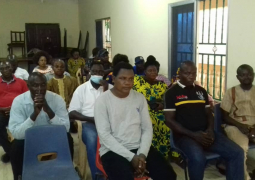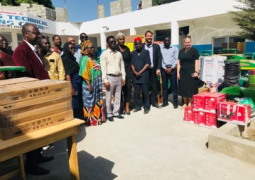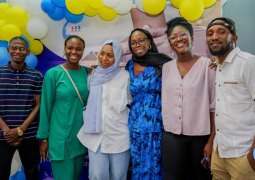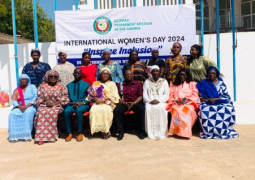The dialogue brought together development partners, government representatives, technical experts, the private sector, civil society, producer organizations, research institutions and others to consult on priority areas in the COVID-19 response and recovery, and to discuss opportunities to deepen partnerships in the immediate, mid- and long-term.
“We need to change our mindset and how we establish partnership, in the ways that we work together, relate to each other, and support each other,” FAO Deputy Director-General Beth Bechdol told more than 250 participants. She added “Knowledge, innovation and partnerships are how FAO, with strong partnership, has built its comprehensive COVID-19 response and recovery programme, with Africa regional priority actions, very much at its heart.”
“The core of this event will be about hearing from participants and their views on Food and Agriculture’s response in the Africa region as well as possible thematic and geographic interests for joint action. This will be an integral part of the continuing dialogue which can be followed up by partners as necessary,” said FAO Assistant Director-General and Regional Representative for Africa, Abebe Haile-Gabriel who moderated the event.
Ade Freeman, FAO Regional Programme Leader for Africa, presented the Africa regional response package which is fully aligned with FAO’s global COVID-19 Response and Recovery Programme. Partners welcomed the FAO’s proposed joint action, provided constructive feedback and expressed their willingness to continuously collaborate with FAO in respective areas concerned.
COVID-19 in Africa
Cases of COVID-19 have been reported in almost all African countries. Across the continent, more than 910,000 cases have been recorded, and more than 19,000 deaths, and numbers are rising (Source: Africa CDC).
FAO’s recent State of Food Security and Nutrition in the World 2020 report found that hunger is also on the rise in Africa, particularly in Sub-Saharan Africa.
Several African countries are on the frontline of an impending hunger crisis driven by COVID-19, where existing high levels of food insecurity are being exacerbated by measures to control the pandemic as well as overlapping shocks such as conflicts, droughts, floods and pests including Desert Locust.
“COVID-19 is reversing the development progress made by the African continent in recent years and is threatening its ability to meet the Sustainable Development Goals by 2030. The pandemic is fast leading to a food and nutrition crisis and exacerbating the challenges in Africa’s already-fragile food system,” said African Union Commissioner for Rural Economy and Agriculture Josefa Sacko. She added “It is now time to focus all opportunities that the crisis has brought forward and Build Back Better towards food system transformation in Africa.”
FAO’s response
The seven priority areas underpinning FAO’s response to the COVID-19 pandemic are reinforcing a global humanitarian response plan for COVID-19; improving data for decision-making; ensuring economic inclusion and social protection to reduce poverty; bolstering trade and food safety standards; boosting smallholder resilience for recovery; preventing the next zoonotic pandemic through a strengthened One Health approach; and triggering food systems transformation.
Closing the dialogue, Abebe Haile-Gabriel said "Following this event, we expect a series of sub-regional and country dialogues to follow. We are going to pursue and facilitate sub-regional, with Regional Economic Communities, as well as country level dialogues, so that they could follow the specificities of each subregion and country and support what’s required at those levels. Indeed, country level interactions with partners across the board would be vital to see how best to meet needs and pursue joint action, as well as continuously monitoring the evolving situation.”
Other partner speakers at today's event included H.E. Josefa Leonel Correia SACKO, AU Commissioner for Rural Economy and Agriculture; Gerald Masila, Executive Director, East African Grain Council, Sara Mbago-Bhunu, Regional Director of East and Southern Africa, International Fund for Agricultural Development (IFAD), Simeon Ehui, Regional Director for Sustainable Development for Africa, The World Bank, Tom Owiyo, Senior Adviser to the Vice President, Agriculture, Human and Social Development, African Development Bank (AfDB), John Kelley, Chargé d’Affaires, a.i., the U.S. Mission to the African Union (USAU), Apollos Nwarfor, Vice President for Policy and State Capability, Alliance for a Green Revolution in Africa (AGRA), and Elizabeth Nsimadala, President of Pan African Farmers Organization (PAFO).
Read Other Articles In National News

Concern Nigerians interim committee in Gambia presents report to members
Aug 27, 2021, 10:56 AM




